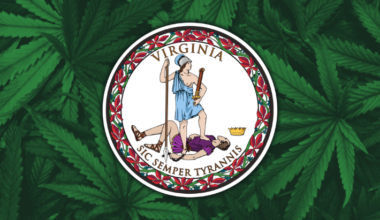Like the majority of Americans, Vice President Kamala Harris has changed her views on marijuana.
In 2010, when she was San Francisco’s district attorney, Harris urged voters to reject a proposed ballot initiative to legalize the adult-use marijuana market. At the time, Harris’ position aligned with that of most California voters, 54 percent of whom ultimately decided against the measure.
But not long after, Harris — and most Americans — changed their stance.
In 2016, Californians reversed course and passed Proposition 64 legalizing marijuana statewide. And in 2019, Harris — then California’s junior U.S. senator — sponsored legislation to end the federal prohibition of cannabis. That same year, Gallup pollsters reported that some two-thirds of Americans believed that “the use of marijuana should be legal” — up from 46 percent in 2010.
Today, public support for legalization stands at 70 percent.
As Vice President, Harris has repeatedly stated that Americans should not be incarcerated for marijuana use. She’s championed the Biden administration’s efforts to pardon low-level marijuana offenders and to loosen certain federal cannabis restrictions.
And as the Democratic presidential nominee, she’s the first major party candidate to have ever called for the plant’s legalization and regulation.
Harris’ trajectory from marijuana legalization skeptic to proponent mirrors that of many Americans. Like most voters, her views on cannabis softened following the legalization of marijuana for medical purposes. As district attorney of San Francisco, Harris pledged not to prosecute people who either used or sold medical cannabis.
“In my own life, I have had loved ones and close friends who relied on medical marijuana to relieve their suffering and even prolong their lives,” she acknowledged. Many Americans had similar experiences — which is why nearly 20 states approved medical cannabis access between 1996 and 2011, almost all by voter initiative.
But it wasn’t until 2012 that voters gave the green light to outright legalization. That year, voters in Colorado and Washington became the first to approve measures regulating the adult-use cannabis market. By 2016, the total number of legal states had risen to nine.
Today, 24 states — home to more than half of the U.S. population — have legalized marijuana.
How has America reacted to this real-world experiment? For Harris, living in a legal state likely influenced her transition from a one-time critic into a staunch advocate. That’s been the case for many others too. In states like California and Colorado, a greater percentage of voters back legalization now than they did when the laws were initially enacted.
Further, no state has ever repealed its marijuana legalization laws. That’s because these policies are working largely as voters and politicians intended — and because they’re preferable to cannabis criminalization.
State-level legalization has led to a drastic reduction in low-level marijuana arrests and prosecutions. It’s significantly disrupted the illicit marketplace, and it’s led to the creation of over 400,000 full-time jobs. Taxes from regulated cannabis sales have generated over $20 billion in state revenue. And contrary to some critics’ fears, marijuana legalization and regulation has not led to any increase in cannabis use by young people.
But while Americans’ attitudes have shifted over the years, federal marijuana policies have largely remained static.
In Congress, far too many politicians remain wed to the sort of “Reefer Madness” view that most voters have long since abandoned. Like Harris did, they also need to evolve their views on cannabis to more closely align with current scientific and public consensus. Those who refuse to adapt do so at their own political peril.
This op-ed was originally published in The Pittsburgh-Post Gazette and syndicated by OtherWords.
Related
Medical Disclaimer:
The information provided in these blog posts is intended for general informational and educational purposes only. It is not a substitute for professional medical advice, diagnosis, or treatment. Always seek the advice of your physician or other qualified healthcare provider with any questions you may have regarding a medical condition. The use of any information provided in these blog posts is solely at your own risk. The authors and the website do not recommend or endorse any specific products, treatments, or procedures mentioned. Reliance on any information in these blog posts is solely at your own discretion.







